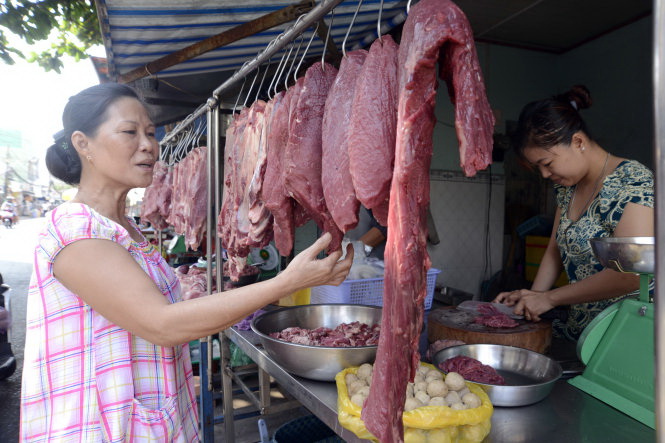The threat of contaminated food in Vietnam shows no sign of disappearing with ‘fake’ beef now a hot topic.
Many food stalls in Ho Chi Minh City claim that their products are home-made, but the quality of the meat is only known to producers.
Khuong Tran Phuc Nguyen, head of the inspection division under the city’s animal health department, said that local authorities have detected many cases involving fake beef meat produced by drenching pork or buffalo into chemicals.
“Some facilities also produce venison and porcupine’s meat using a similar procedure,” Nguyen added.
On April 2, the department found an illegal buffalo meat import facility on Nguyen Thi Thuy Street in Tan Phu Trung Commune, Cu Chi District, Ho Chi Minh City, during an inspection.
There were 2,200 kilos of frozen buffalo meat imports from India waiting to be processed into beef, which was then supplied to provincial markets and eateries, inspectors said.
In February, the department also detected Binh Hanh Co. Ltd. in District 3, Ho Chi Minh City, using sodium metabisulfite and cow blood to transform pork into beef, which was due to be delivered to local food venues.
Sodium metabisulfite, used as a disinfectant, antioxidant and preservative agent, is banned in meat processing, Huynh Tan Phat, deputy chief of the city’s animal health department, said.
It is the same story when it comes to its processed equivalent, said reporters of Tuoi Tre (Youth) newspaper who bought packages of ‘cha bo,’ or Vietnamese beef ham from a producer in Tan Binh District, Ho Chi Minh City.
The store owner said that there were two types of ham available, fried and those used as toppings in ‘bun bo,’ or beef noodles, adding that all products of the shop are made purely from beef.
However, when the reporters sliced open a piece of the fried beef ham, they realized it featured a strong sense of pork flavoring.
“The meat may have been mixed with pork left in the meat grinder when processing,” explained the shop owner when being asked about the appearance of pork flavor.
Another ham facility nearby revealed that to make fried beef ham, it is critical to mix 50 percent beef with pork so that the product will have pleasant yellowish color after being fried.
“If we fry beef only, the ham turns into a blackish color, which is unappealing to buyers,” said the producer, adding that it is really difficult to spot the genuine product.
Tran Van Cong, owner of a local beef ham manufacturer, said that beef hams are produced from beef round, whose wholesale prices are at least VND250,000 (US$11) per kilo.
“The high-quality beef ham costs VND260,000 [$12] per kilo, which yields little profit for retailers and producers,” Cong said, emphasizing that “those tagged at VND200,000 [$9] per kilo cannot be made purely from beef.”
“At that price, mixing other meats is the only profitable solution,” Cong said.
National food test results
The National Institute for Food Control has recently announced test results on beef products.
Among 44 beef samples collected from Hanoi, eight were made from pork, and one was buffalo, with two out of 12 beef brisket samples faked using pork.
The results also revealed little to no beef in some beef sausage samples, which were made mainly from pork, while nine out of 20 samples of beef ham contained nothing but pork.
Two out of 10 beef noodles’ meat samples were also bogus as the ‘beef’ toppings were pork.
Health threatening
Experts are keen to alert consumers of the dangers of consuming such products.
Le Thanh Hien, dean of the Department of Infectious Diseases and Veterinary Public Health of Nong Lam (Agriculture-Forestry) University in Ho Chi Minh City, said that the substance that local investigative bodies have detected in recent times is metabisulfite, which was banned by the U.S. Food and Drug Administration (FDA) in 1986 due to its side-effects on people sensitive to it or those suffering from asthma.
Metabisulfite also has a significant link to thiamine (vitamin B1) deficiency, Hien added.
“Further examination should be performed on all food products including foodstuffs which are usually subject to counterfeiting,” insisted one food expert, reasoning that additives and chemicals, to create ‘food,’ along with their toxicity must be brought to light to protect consumers’ rights.
Like us on Facebook or follow us on Twitter to get the latest news about Vietnam!
























































